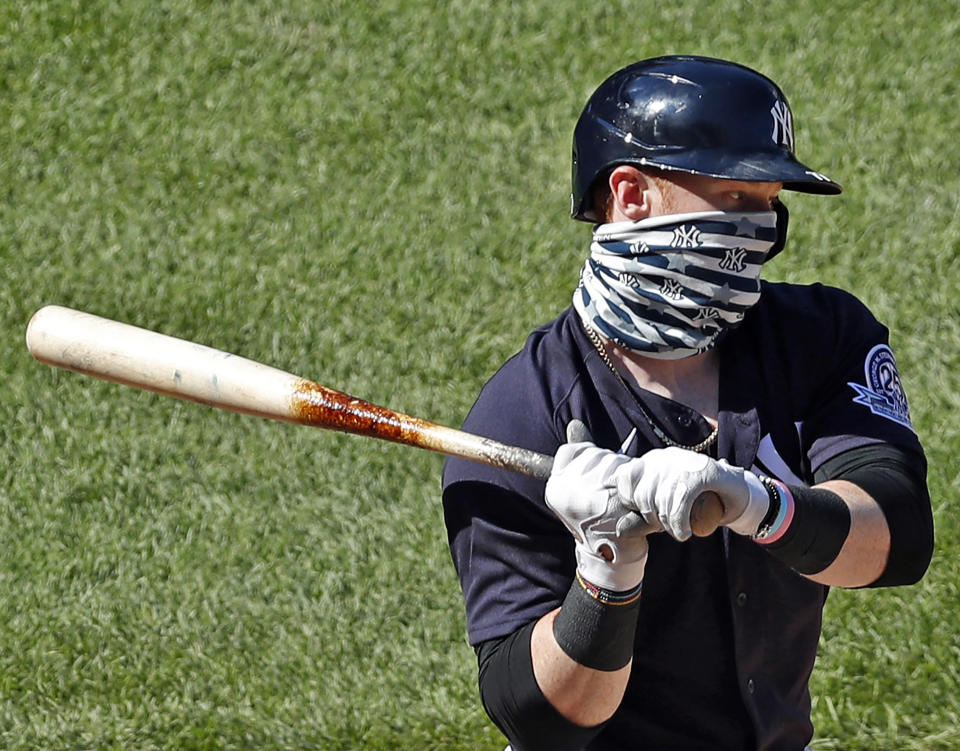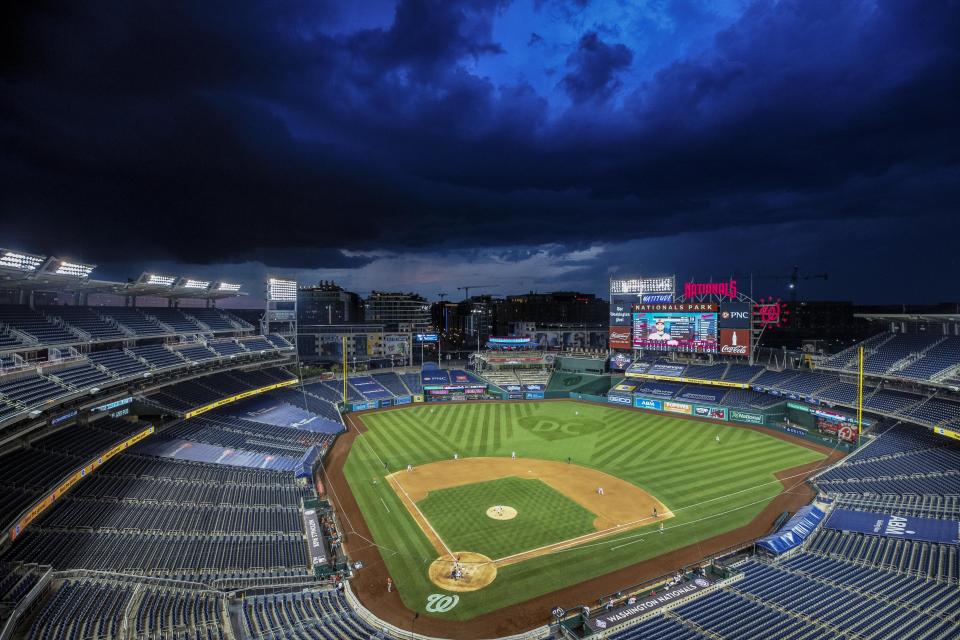Baseball made it to opening day. Is it ethical to be happy it's back?
A few weeks ago, a baseball executive asked me how likely I thought it was that we would make it to opening day. Which is just another way of asking how likely I thought it was that the season imploded before a single meaningful pitch was thrown.
I offered a tepid prediction premised more on how unpredictable the past six months have been than any particular insight. Frankly, I don’t even know what it would take to call off MLB’s 2020 season for good — and if my sources do, they’re not saying — but sometimes people outside baseball ask me if I think the death of someone in the game would do it.
When I think about it like that, even the speculation seems ethically ambiguous. Who has to die in order for baseball to concede 2020 to the coronavirus? Other than 143,000 people unaffiliated with the sport.
They’re playing anyway, so I have to want it to work. What does that even mean in a country where the death toll is guaranteed to keep rising? Is any of it worth the risk if we don’t bother to enjoy the baseball? That sounds trivial in comparison to the pandemic, but writing off the season as a craven money grab hurts yourself more than the owners (who won’t feel the frustration of fans refusing to buy tickets when there are none available).
Is the season’s success as suspect as its potential failure if it serves as a convenient distraction at the height of our country’s failure to contain the virus? Is even saying that an insult to the grim reality of what failure means in this context? Is it a form of delusion to focus on the role of spectator-less sports in the midst of a national crisis? To focus on the health of a single person just because he plays baseball? Is it fair to appeal to players’ sense of personal responsibility to keep their teammates and the industry afloat when our interest creates an economic incentive to put themselves at risk?

That’s an uncomfortable thought, and we’re just getting started.
Make it to opening day, we have, and now comes the hard part: A daily grind of teams congregating and trying to keep up an ambitious every-other-day testing schedule without the kind of delays that plagued summer camps, while accepting the ramifications of not testing daily. Interacting with the community — if only for food — in their hometowns and on the road. Going on the road even as states try to stem the spread between one another.
As they ramped back up to real baseball, teams have been acting with “an abundance of caution,” canceling workouts when results weren’t received in time and keeping players quarantined in accordance with local ordinances. It seems wrong on its face to think that the arbitrary designation of a game as “mattering” to the “standings” will meaningfully alter this sort of risk assessment. But of course that’s what has to happen, it’s what everyone in baseball is counting on.
The more I try to think about the big picture — bigger than who will win in a showdown between Gerrit Cole and Max Scherzer, sure, but also bigger than whether the safety protocols are sufficient to allow an industry to return to work, because even that implies that a pandemic isn’t a good reason to rethink our relationship with sports and capitalism wholesale — the more questions I have. I say “there are no good options” a lot lately. But maybe that’s a cop out. Maybe I just need to look harder.
Dr. Arthur Caplan has written a book called “The Ethics of Sport”; he’s the founding head of the Division of Medical Ethics at NYU School of Medicine and is a co-chair on the Mayors Advisory Panel on Sports, Recreation & Health that formed in May. When I talked to him, I expected equivocation and ambiguity.
Instead, I got cut off.
Are sports complicit in—
“Yes,” he said in no uncertain terms.
But from there, it gets more complicated.
Caplan clarified that, “I’m not in the camp that says, ‘Baseball? Who the hell cares?’
“I don’t think of baseball or any particular sports as just trivial or frosting on the cake. I see them as, I’m gonna say it, essential,” Caplan said.
And for a nation that should be cooped up at home more as a safety precaution, he considers providing entertainment to a captive audience a social service — even if it’s incidental to the actual financial motivations spurring the sport’s return.

“They don’t want to lose money and they’re playing to the TV contract, I get all that,” he said. “But that doesn’t bother me because I think it serves some public good.”
That public good justifies trying. Caplan just thinks baseball, frankly, should be trying a little harder.
“Trying smarter,” he said. Ethics, it seems, is not all sweeping hypotheticals. Amorality is in the details.
Caplan prefers the idea of a well-insulated “bubble” like what the NBA and the NHL are building around their athletes. He thinks leagues could use fewer tests — currently an abuse of resources that strains the ethics of MLB’s whole operation — if they stayed sequestered.
“I don’t know it can work, but I think it’s worth trying,” he said. “Anything that involves big teams traveling all over the place, particularly to COVID hot spots, I don’t think is ethical.”
In a pandemic, then, what’s right hinges on what’s sufficient for the safety of the participants. This is not to say it’s easy, but it is knowable. It’s literally science. We can choose to listen to the experts and stay critical. In fact, it’s important to do so. To not let the overwhelming nature of all the questions and competing motivations complicate the fact that we can and should interrogate the specifics.
“In sports, if you can get to the third paragraph without mentioning COVID, you’re probably not writing properly,” Caplan says. “COVID is the driver in thinking about everything these days in any sport.”
It’s a helpful perspective heading into opening day, and it’s a decent baseline from which to operate. But personally, even when centering the coronavirus in stories, I still worry about my blind spots and biases (full disclosure: my job is better when there’s baseball). I worry about the costs we haven’t considered yet and the inevitability of human error. I worry that we’ll never know if a summer without baseball would have been safer, or just stranger.
Baseball is coming back; don’t believe anyone who tells you they know what’s going to happen next. The best we can do is embrace the ambivalence.
More from Yahoo Sports:
